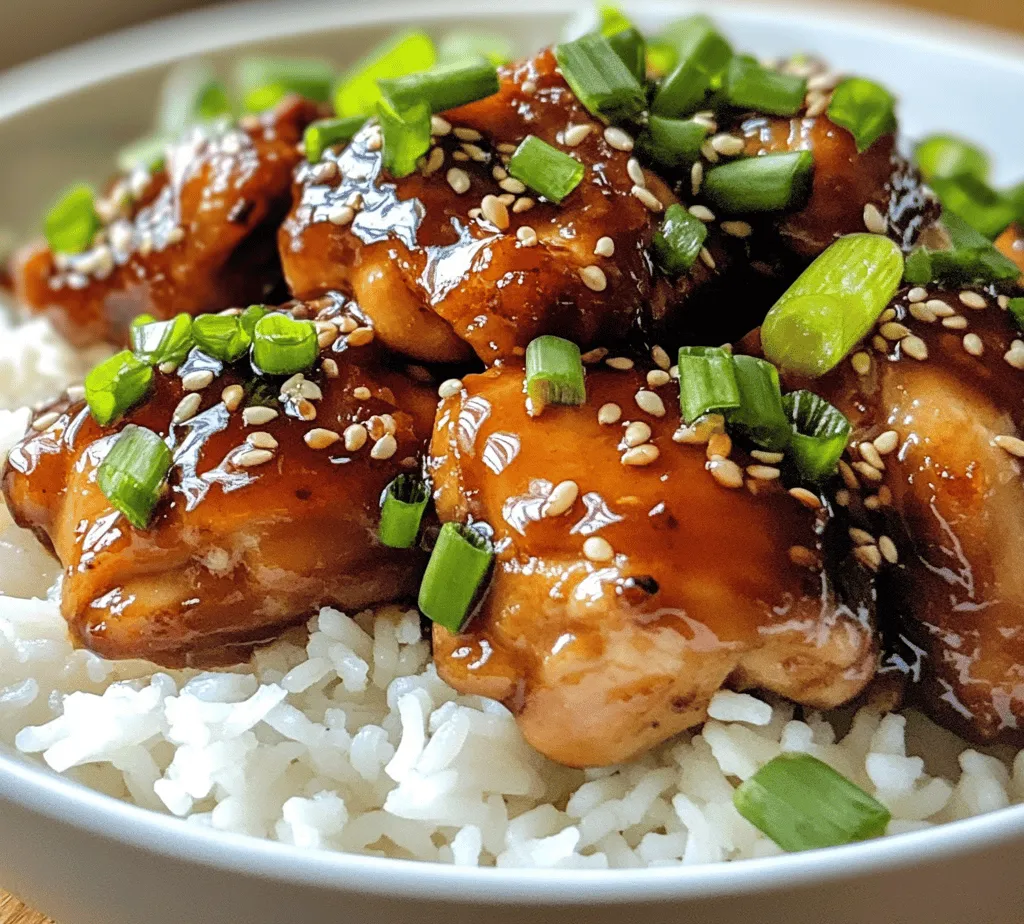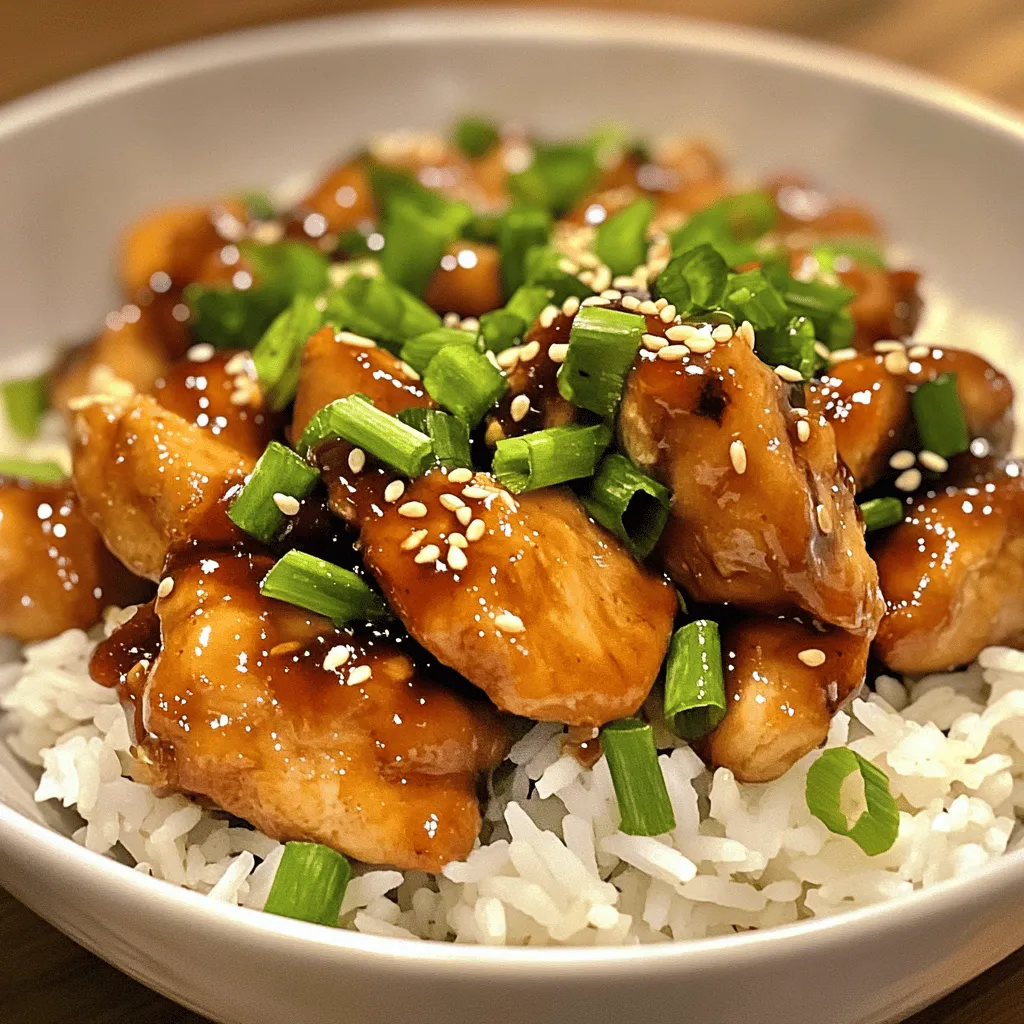Introduction
In today’s fast-paced world, finding a delicious and quick meal can often feel like a challenge. However, this 20-Minute Sweet Savory Mongolian Chicken recipe is here to save the day. Perfectly marinated chicken thighs, aromatic garlic, and ginger, combined with a rich sauce, create a dish that is not only easy to prepare but also bursting with flavor. Imagine a tender, juicy piece of chicken coated in a glossy, sweet-savory sauce that clings to each bite, satisfying your taste buds in a matter of minutes. This article will guide you through the steps of making this delightful recipe, exploring the ingredients, cooking techniques, and serving suggestions, ensuring that you can create a restaurant-quality meal right in your kitchen.
Understanding the Basics of Mongolian Chicken
Mongolian chicken is a dish that has gained popularity in many parts of the world, particularly in Western cuisine, often found in Chinese restaurants. While it may not have origins in Mongolia itself, the dish embodies the essence of Mongolian cooking, which is characterized by hearty ingredients and a robust flavor profile. Traditional Mongolian cuisine is influenced by its nomadic heritage, where meat and dairy are staples, and cooking methods often revolve around grilling, boiling, and stewing.
The common ingredients found in Mongolian dishes include various meats, vegetables, and seasonings, creating a fusion of flavors that are both rich and satisfying. In the case of Mongolian chicken, the sweet and savory flavors are brought to life through a harmonious blend of soy sauce, garlic, ginger, and sweeteners like brown sugar and hoisin sauce. This flavor profile not only tantalizes the palate but also provides a perfect balance between sweetness and umami, making it a favorite among many.
Ingredients Breakdown
Understanding each ingredient used in the 20-Minute Sweet Savory Mongolian Chicken recipe will help you appreciate the dish even more. Here’s a detailed look at what you’ll need:
– Boneless, skinless chicken thighs: For this recipe, chicken thighs are the best choice due to their tenderness and flavor. Unlike chicken breasts, which can become dry when cooked quickly, thighs retain moisture and create a juicy bite that complements the sauce perfectly. Their slightly higher fat content also contributes to a richer flavor, making them ideal for quick cooking methods.
– Vegetable oil: The role of vegetable oil in this recipe is crucial for achieving crispy chicken. A high smoke point oil, such as canola or peanut oil, allows for a good sear without burning, ensuring that the outside of the chicken becomes golden and slightly crispy while the inside remains tender.
– Garlic and ginger: These aromatics are essential for creating depth in flavor. Garlic adds a pungent sweetness, while ginger contributes a warm, spicy note that brightens the dish. Sautéing these ingredients not only enhances their flavors but also infuses the oil, adding an aromatic base for the chicken.
– Soy sauce: This fermented sauce is a cornerstone of Asian cuisine and provides a salty umami flavor that elevates the dish. There are various types of soy sauce, such as light, dark, and tamari, each with different flavor profiles. For this recipe, a combination of light soy sauce (for seasoning) and dark soy sauce (for color and richness) can create a well-rounded taste.
– Brown sugar and hoisin sauce: These ingredients introduce the sweet element that contrasts beautifully with the savory components. Brown sugar provides a deep molasses flavor, while hoisin sauce adds complexity with its blend of sweet, salty, and slightly spicy notes. Together, they create a luscious glaze that coats the chicken.
– Rice vinegar and sesame oil: Adding a tangy twist, rice vinegar balances out the sweetness and enhances the overall flavor profile. A drizzle of sesame oil at the end of cooking adds a nutty aroma, enriching the dish and providing a finishing touch that elevates the entire experience.
– Crushed red pepper flakes (optional): For those who enjoy a bit of heat, crushed red pepper flakes can be added to the sauce for a spicy kick. It’s an easy way to customize the dish to your taste preferences.
– Garnishes: green onion and sesame seeds: These garnishes not only add a pop of color but also contribute additional layers of flavor and texture. Chopped green onions provide a fresh, mild onion taste, while sesame seeds add a nutty crunch.
Preparation Steps
Now that you have a comprehensive understanding of the ingredients, let’s dive into the preparation steps that will guide you through creating this mouthwatering dish.
1. Prepping the chicken: Start by cutting the boneless, skinless chicken thighs into bite-sized pieces. This not only helps with quick cooking but also makes the chicken easier to absorb the sauce. Make sure to remove any excess fat for a cleaner taste. Once cut, place the chicken in a bowl and add a tablespoon of soy sauce to marinate. Allow it to sit for about 10 minutes while you prepare the other ingredients.
2. Heating the oil: In a large skillet or wok, heat about two tablespoons of vegetable oil over medium-high heat. It’s important to let the oil heat up adequately so that when you add the chicken, it sizzles and begins to sear immediately. This creates a delicious crust on the chicken, locking in the juices.
3. Sautéing aromatics: Once the oil is hot, add minced garlic and grated ginger to the skillet. Sauté these aromatics for about 30 seconds to a minute, stirring constantly. You want to achieve a fragrant aroma without burning the garlic, as burnt garlic can impart a bitter flavor to the dish. The goal is to soften the garlic and ginger, allowing their flavors to infuse into the oil.
4. Cooking the chicken: After the aromatics have sautéed, add the marinated chicken pieces to the skillet. Spread them out in a single layer to ensure even cooking. Allow the chicken to cook for about 5-7 minutes without stirring too much. This will give the chicken a chance to develop a nice golden-brown crust. Stir occasionally to ensure even cooking. Once the chicken is cooked through and no longer pink in the center, it’s time to move on to crafting the sauce.
5. Crafting the sauce: In a small bowl, whisk together the remaining soy sauce, hoisin sauce, brown sugar, rice vinegar, and sesame oil. If you like heat, add a pinch of crushed red pepper flakes to taste. Pour this sauce over the cooked chicken in the skillet. Stir well to coat the chicken evenly, allowing the sauce to thicken slightly and glaze the chicken. This should take an additional 2-3 minutes of cooking. Make sure the chicken is well coated and the sauce is bubbling gently.
With these steps, you are well on your way to creating a delightful 20-Minute Sweet Savory Mongolian Chicken that is sure to impress at any dinner table. Stay tuned as we explore serving suggestions and tips for achieving the best results in the next part of this article.

Cooking Process
Step 1: Searing the Chicken
To achieve that irresistible crispy exterior while retaining the juiciness inside, start by heating a large skillet over medium-high heat. Add a tablespoon of oil to the pan, allowing it to heat until it shimmers. Cut the chicken thighs into bite-sized pieces, ensuring they are not too small, as they will shrink during cooking. It’s critical not to overcrowd the pan; if necessary, cook the chicken in batches. Overcrowding can lead to steaming rather than searing, which will prevent that desirable caramelization. Cook each piece for about 3-4 minutes on one side before flipping them to achieve a golden brown color on all sides.
Step 2: Incorporating Aromatics
Once the chicken is seared to perfection, reduce the heat to medium. This is the perfect moment to add aromatics, such as minced garlic and freshly grated ginger. Add these ingredients to the pan and sauté for about 30 seconds until they become fragrant. Be careful not to burn them, as burnt garlic can impart a bitter taste. The timing is crucial; adding these aromatics too early could result in overcooked flavors that overwhelm the dish.
Step 3: Thickening the Sauce
After incorporating the aromatics, it’s time to add the sauce ingredients. Pour in a mixture of soy sauce, brown sugar, and a splash of rice vinegar. Stir well to combine and allow the sauce to come to a gentle simmer. As the sauce heats, it will begin to thicken. Keep an eye on the chicken; it should cook for an additional 5-7 minutes in the simmering sauce. This cooking time ensures that the chicken is fully cooked through, reaching an internal temperature of 165°F (75°C). The sauce should coat the chicken pieces evenly, creating a glossy, enticing finish.
Step 4: Combining Flavors
Once the chicken is cooked and the sauce has thickened to your liking, give everything a good stir to ensure that the flavors are evenly distributed. This step is essential for achieving that signature sweet and savory balance that makes Mongolian chicken so appealing. Remove the skillet from the heat and let the dish sit for a couple of minutes; this allows the flavors to meld together beautifully.
Serving Suggestions
The Perfect Pairing: Jasmine Rice as a Base
Mongolian chicken is best served over a bed of fluffy jasmine rice. The fragrant rice serves as a perfect canvas to absorb the rich sauce, enhancing the overall flavor experience. Cook the rice according to package instructions, fluff it with a fork, and let it sit covered until you’re ready to serve. The warm rice will complement the savory notes of the chicken, creating a comforting and satisfying meal.
Adding Vegetables: Enhancing Nutrition and Color
For an extra boost in nutrition and a pop of color, consider adding some stir-fried vegetables. Broccoli, bell peppers, and snap peas work exceptionally well. Quickly sauté these vegetables in the same pan before adding the chicken back in, or prepare them in a separate skillet. This not only adds more fiber and vitamins to your meal but also creates a visually appealing plate that is sure to impress.
Serving Styles: Family-Style or Individual Plates
When it comes to serving, you have options. For a family-style setting, place the chicken and rice in large serving dishes and allow everyone to help themselves. Alternatively, for a more formal presentation, plate the chicken over the rice in individual bowls, garnishing with sliced green onions and sesame seeds for added flair. This method not only elevates the dish but also makes for a delightful dining experience.
Nutritional Information
When prepared as directed, this 20-Minute Sweet Savory Mongolian Chicken offers a balanced meal option. Here’s a breakdown of the nutritional content per serving:
– Calories: Approximately 350-400 calories, depending on the serving size and added ingredients.
– Protein: Each serving contains about 28 grams of protein, making it an excellent source of this essential nutrient, particularly due to the chicken thighs. Chicken thighs are not only flavorful but also provide a good amount of protein while being slightly more affordable than chicken breasts.
– Fat: The dish contains around 10-15 grams of fat, primarily from the cooking oil and chicken. Opting for a healthier oil, such as olive oil, can help reduce saturated fat content.
– Carbohydrates: With around 35 grams of carbohydrates, this meal provides a good energy source, particularly from the rice.
– Vitamins and Minerals: The addition of vegetables will enhance the vitamin and mineral profile, providing essential nutrients such as Vitamin C, fiber, and folate.
By enjoying this dish, you not only treat your taste buds but also indulge in a meal that provides a balance of flavors and nutritional benefits.
Variations and Modifications
Substituting Chicken: Options for Vegetarian or Vegan Adaptations
If you’re looking for vegetarian or vegan alternatives to this recipe, consider substituting the chicken with tofu, tempeh, or seitan. Tofu can be pressed and cubed, then sautéed until golden. Tempeh, with its nutty flavor, can be sliced thinly and cooked in the same manner as chicken. For a gluten-free option, ensure to use gluten-free soy sauce or tamari.
Adjusting the Spice Level: Tips for Personalizing Heat
If you prefer a bit of heat, consider adding red pepper flakes or a dash of sriracha to the sauce. Start with a small amount, as it’s easier to add more than to reduce the heat. For those who enjoy milder flavors, simply omit any spicy elements and focus on the sweet and savory components of the dish.
Gluten-Free Modifications: Ingredients for Dietary Restrictions
For gluten-free modifications, use tamari instead of soy sauce and ensure that your rice is prepared without any additional sauces or seasonings that may contain gluten. This way, you can still enjoy the rich flavors of Mongolian chicken without compromising your dietary needs.
Conclusion
This 20-Minute Sweet Savory Mongolian Chicken recipe showcases how a few simple ingredients can come together to create a delightful meal in no time. With its rich flavors and quick preparation, it is a perfect choice for busy weeknights or when entertaining guests. By following this guide, you can confidently prepare a dish that is sure to impress, while also enjoying the benefits of cooking at home.
Whether you are a seasoned cook or a beginner in the kitchen, this recipe offers a rewarding culinary experience that you will want to revisit time and again. With its versatility, you can easily customize it to suit your dietary preferences and spice levels, ensuring that it remains a family favorite. Serve it up with fragrant jasmine rice and a side of colorful vegetables for a well-rounded meal that’s as nutritious as it is delicious. Enjoy the satisfaction of creating a homemade dish that rivals your favorite takeout, all in just 20 minutes!



